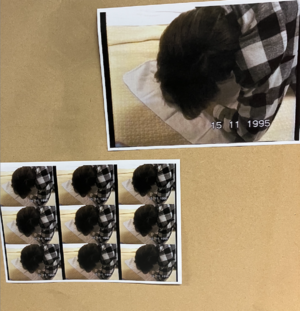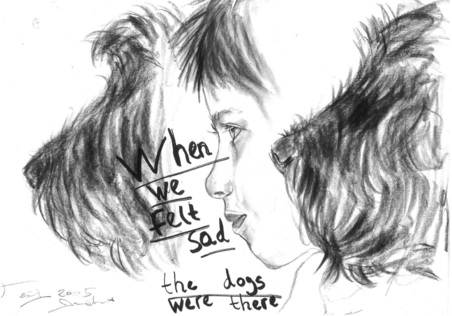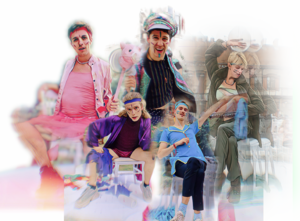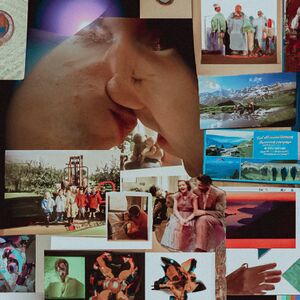Lauprojectproposaldraft
Take me back to ever
What? (two sentences)
A body of work that explores the filmmaker’s youth with a difficult family dynamic and its influence on their present life through patterns that repeat themselves.
In the work the maker will unpack certain memories through their own perspective from the now, reframing a linear history and finding poetry within the given images.
How?
I will work with a big family archive of digitalised films that my dad shot from my birth until I was about 10. A moving image piece containing this footage will be the central point of the work, but it will be placed in an environment with other objects that embody certain points of this time journey. Through their placement they will have a dialogue with each other.
Workflow
Working on this project will be a circular system where I edit and play with the archive material, research the given themes of interest that pop up while watching the footage and write texts that reflect on the outcomes of the other two. Each discovery within the edit, research or writing will influence the next choice. When the exploration phase is over I use writing to make a script that will give the work a structure and a final outcome.
Timetable
Collecting
September:
Collecting and ordering material, setting up a workflow. Spotting archival footage
October:
Writing first texts based on these images. Making sketches, combining image and text. Reflecting on demo’s, trying three different forms.
Harvesting
November:
Working on Graduate Proposal
Week 46: 17th of November proposal deadline
December:
9th of December. KALEIDO: try-out of a spacial element from the work I made in a public event. Reflecting on these outcomes
Structuring
January
Rewriting voice-over, making a script and a fit structure
February
Shooting new footage, if necessary
Shaping
March
Editing
April
Editing
Finishing
May
Researching the spacial elements of the work. Making an exhibition plan.
June
Sound-design, grading
July
Preparing for exhibition.
Deadline project 24 July
Relation to previous practice
During my bachelor's I was primarily focused on documentary and fiction films in a traditional way in the role of a writer and director. Now I want to focus on a more autonomous way of making, in which I work more playful, solistic and smaller, hands on and with material from various sources. I also want to play with the idea of expanding the work from only a single screen piece and use my current performance background as a tool as well.
Choices
Last year I chose to let go of the conventions that I implemented in my practice as a traditional fiction director and started again by making from scratch. I tried to let go of old ways of producing images in a more conventional role and learned to be curious again to new forms where I can operate more freely.
Why
Generational trauma is a theme that is widely recognizable in multiple cultures and for a lot of people. I believe there is a certain universality in my family’s story, where more people can find support in. I also believe mental healthcare in the Netherlands is quite messed up and I feel all of us could have had better help.
I’m from the south of Limburg, which is quite a conservative part of the Netherlands and where subconsciously a catholic mindset is still very present.
My parents grew up in traditional families in small villages and had to live up to mostly my grandfather’s standards. I believe the harsh mentality of both of my grandfathers has left an enormous footprint on my parents mental well being. My mother has been hospitalized with depression for the first time when I was just born, and up until this day she is still struggling with her health. Looking back years later I observe how the notion of traditional gender roles and a heteronormative mindset are now still very present in the area where I grew up.
Also I, as a non-binary queer person, have struggled with the heritage of this worldview. In my own life I found myself feeling a lot of time pressured by patriarchal and neoliberal standards. This fight between the status quo and your own desire has caused mental problems that were similar to the ones my mom experiences.
With the work I want to visualize how certain family patterns have been of influence through multiple generations of my family and caused a lot of mental problems. Both of my parents struggled with this, as I did as a non-binary/queer person. The old footage brings a happy view of the past, showing parts of the story, affection, and happiness of a traditional family. The contemporary gives a view on life now, alludes to less happy elements and these are conveyed through the text by reflecting on a shared trauma. I believe this work can be recognizable for a lot of people with parents that have mental issues. As a child these were the stories that were lacking a lot. I also want to question the notion of perspective. Me, my mother and father all have experienced these past decades differently. And the archive I'm using contains footage where all three of us seperately held the camera and filmed each other.
Relation to larger context
Thematically I resonate with other queer artists that try to uncover society’s demands and show the desires and stories within the community. Examples are David Wojnarowicz and Nan Goldin.
My focus on personal experiences and emotions aligns with the trend of autoethnographic storytelling, while my exploration of the queer community connects to the study of gender and sexuality in queer theory. I relate to other artists who used their personal experience as part of their work, such as Barbara Hammer and writer Ocean Vuong. In the future I’d like to focus on artists and writers who use healing and the (queer) body as a main theme in their work.
Current big influences for me are ‘How To Save A Death Friend’ by … and ‘Tarnation’ by Jonathan Caouette. In both work the filmmakers reflect on the mental health of a loved one, using and re-editing personal footage.




